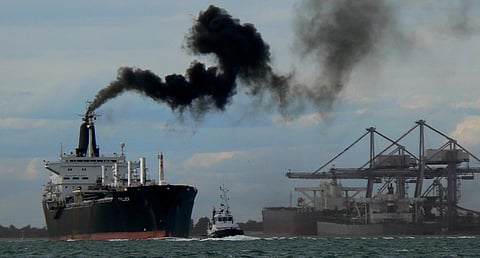

We are only months away from an event which will not only change world shipping forever but possibly the world's economy as well. On January 1, 2020, the IMO will enforce the reduction of global sulphur cap for ships heavy fuel from 3.5 per cent to 0.5 per cent. The implications of this regulation change are far reaching and the impact has yet to be fully appreciated.
Barely 12 months ago there were only scraps of a mention about this change in the maritime press and absolutely none in the public media. Today, marine news feeds are on fire with discussion and criticism of this new MARPOL regulation. Ship owners have literally bought out all available stocks of exhaust gas scrubbers, others are criticising the speed of implementation while others are scrambling for some form of dispensation to continue to use high sulphur fuel oil (HSFO) in regions where the supply is limited.
There's been concern that refineries cannot sustain the supply of low sulphur fuel and then there have been restrictions in major ports on the discharge of effluent water from open loop scrubbers. There is an underlying air of panic in the shipping world.
This regulation change is the first of IMO's contributions to reduce the atmospheric pollutants and greenhouse gas (GHG) emissions from ships exhausts.
The immediate and underlying questions that spring from this change are why and why now.
Firstly, shipping is the greatest consumer of liquid fuel in the world and a major contributor to air pollution. Shipping's huge appetite for fuel oil outstrips automobile and vehicle consumption but that sector has already reduced the fuel sulphur content.
So it follows that atmospheric emissions of SO2 from ships' exhausts are one of the world's biggest air pollutants. True, GHG emissions from ships are small compared to coal fired power stations, but there's no votes in policies that have an adverse effect on jobs, economies or development. So, regulators like IMO have tackled this problem head-on amid much criticism from within their own industry.
DNV GL has recently updated an excellent paper describing the global sulphur cap initiative and the options on how ship owners can comply. Simply put, they are:
Of the four options, LNG fuel is the best long-term solution with minimal GHGs or sulphur content. But the cost of LNG conversions is prohibitively expensive and virtually rules out retrofits. It will be the preferred choice for future newbuilds. Exhaust gas scrubbers are the most expedient and cheapest solution for existing ships but the sodium-rich wash water creates a disposal problem in many regions.
Open loop scrubbers (discharging directly to the sea) have already been banned in some of the world's major ports and other regions are expected to follow. Closed loop scrubbers create an on-board storage problem and are more expensive than the open loop type. Low sulphur fuel oil and blended HSFO options present increased costs for refineries and limitations on supply for many shipping routes.
The common issue with all these options is the costs involved which range from very expensive to crippling. The DNV GL paper compares the cost benefits of each option for different size ships and all involve increased costs to the ship owner. No surprises there.
Whether it is the high cost of low sulphur fuel or the cost of fitting scrubbers to the exhaust system, all these expenses are going to be passed on to customers. In short, everything that is transported by sea (and that amounts to over 90 per cent of the world's goods) will cost more. The 2020 global sulphur cap will have an impact on economies worldwide. The question is: have the governments around the world factored into their economic models a sudden increase in the cost of just about everything from fuel, to consumer goods to bulk products. Can they sustain the impact that everything will cost more?
No wonder politicians are blindly trying to ignore it. The general public doesn't understand how reliant they are on shipping but sudden cost increases for just about everything will grab their attention. They will want to blame someone and who better than their elected leaders.
The fact that this regulation change hasn't made it into the daily press is an indication of how ill-informed the public and journalists are. Scary Y2K scenarios were common in the lead-up the new millennium. Nothing happened. The global sulphur cap is just as scary but something will surely happen. It will be interesting to see what.
Exactly twenty years ago to the day we expected the world to change with Y2K. Watch what happens on January 1, 2020.
